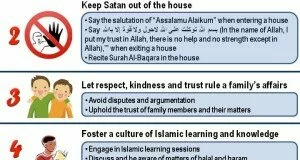Question: Dear scholars, I really need your advice! Here in Bangladesh, people always celebrate the 15th night of the month of Sha`ban, which they call “the Night of Shabe-e-Barat”. What do you think of such a practice? Please enlighten me on this issue.
Answer:
In the Name of Allah, Most Gracious, Most Merciful.
All thanks and praise are due to Allah and peace and blessings be upon His Messenger.
Dear questioner, We really appreciate the confidence you place in us and the great interest you show in understanding the teachings of Islam.
In the hadith reported by Imam At-Tabarani, the Prophet (peace and blessings be upon him) is reported to have said: “Truly, there are nafahat (blessed seasons or days) in which your Lord vouchsafes plentiful mercy. So, make sure that you make the best use of such seasons!” A true believer should purify himself from the fleshly inclinations and the earthly desires and make his aspirations so high and beseech Allah for mercy in such blessed seasons which witness the abundant mercy of Allah. One point here to be stressed is that a true Muslim should consider his whole life a long-term season of obedience so as to show gratitude to the everlasting blessing of Allah.
Responding to the question, Dr. Muzammil H. Siddiqi, president of the Fiqh Council of North America , states,
The month of Sha`ban is the eighth month of the Islamic lunar calendar. The fifteenth night of this month is known as laylatul-bara’ah (the Night of Innocence) or laylat un-nisfe min Sha`ban (the Middle Night of Sha`ban) in the Arab world. In India, Pakistan, Bangladesh, Iran, Afghanistan, etc., it is known as shab-e-barat. Some people believe that in surat Ad-Dukhan (44:3-4) there is a reference to this night as Allah says, (We sent it (the Qur’an) down during a blessed night. We are truly Warners. In that night is made distinct every affair of wisdom.) But the night referred to here cannot be a Sha`ban night because it is said here clearly that the Qur’an was revealed in this night. We know from the surat Al-Qadr (97) that the Qur’an was revealed in the Night of Qadr and we also know from the Qur’an (Al-Baqarah 2:185) that the Qur’an was revealed in the month of Ramadan. So it is obvious that the night of the revelation of the Qur’an was in Ramadan, not Sha`ban, and that it was laylat ul-qadr (the Night of Power) not shab-e-barat.
Some people also say that in the 2nd year of Hijrah, the direction of the Qiblah was changed from Jerusalem to the Ka`bah in Makkah on the 15th day of Sha`ban. This report is also not confirmed by authentic hadiths. According to most of the exegetes, the Qur’an has not mentioned anything about the Sha`ban night.
There are some hadiths that speak about the Middle of Sha`ban and its night. However, the scholars of hadith say that most of the hadiths concerning this night are not authentic. They are weak (da`if) according to the criteria of the narrators and scholars of Hadith. Imam Al-Mundhiri (died in 656 A.H.) in his famous book At-Targhib wat-Tarhib (vol. 2, pp. 116-120) reported fourteen hadiths on the subject of this night. The following points can be summarized from those hadiths:
1. The month of Sha`ban is a great month.
2. In this month Allah takes the account of His creation.
3. Because this month occurs between two other important months, viz. Rajab and Ramadan, many people do not pay enough attention to it.
4. The Prophet (peace be upon him) loved to fast during this month. He used to fast most of the month of Sha`ban.
5. After sunset on the night of Middle of Sha`ban, Allah in His great mercy and kindness turns towards His creation and asks, “Is there anyone who would seek My forgiveness and I forgive him (or her)? Is there anyone who is in need to ask Me and I provide for his (or her) needs. Is there anyone who is in pain and seeks My help and I help him (or her)? Is there…? Is there…?” until the time of Dawn.”
6. The Prophet (peace and blessings be upon him) is said to have recommended prayers during this night and fasting during the following day.
7. It reported that the Prophet (peace and blessings be upon him) used to visit the Muslim cemetery on this evening and he used to pray for the deceased Muslims.
These are the things that we learn from some hadiths about the significance of this night. However, there are many practices and customs common in some Muslim countries, such as making a sweet dish, setting off fireworks, etc. These things have no meaning and no reference in hadiths. There are also some superstitious beliefs about this night. For example, some people believe that the spirits of the deceased visit their relatives during this night. Some believe that there is a special tree in Heaven upon whose leaves are the names of all human beings, and whatever leaves drop during this night, those people are destined to die in this year. Some think that the decisions about the life and death of people are made during this night. All these beliefs and superstitions do not belong to the authentic teachings of the Qur’an and Sunnah.
We must try to follow the Qur’an and the authentic Sunnah of the blessed Prophet (peace and blessings be upon him). It is our duty as Muslims to take advantage of all good occasions to revive our faith, to purify our souls, and to increase our love and devotion to Allah (glory be to Him), but we must follow the Sunnah of the Prophet (peace and blessings be upon him). We must not do anything in our celebrations that is against his teachings.
Allah Almighty knows best.
Source: Onislam.net
 Muslim Blog Muslim Blog
Muslim Blog Muslim Blog





